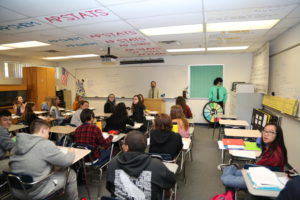Policy rules everything
December 14, 2015
You’re at a Speech and Debate tournament. You only recently joined your school’s team, and the coach invited you to observe at their next tournament, just to get a feel for how the activity works. It’s highly competitive and pretty intense – you’ve learned that much already – and after watching a couple rounds of debate and all too many Impromptu speeches, you’re starting to get a feel for how this Speech and Debate thing works.
For the moment, you’re taking a quick break from all the action by standing next to the ballot table, where judges turn in the scores and rankings they give to competitors at the tournament. For some reason, the coaches at the table are looking ever so slightly testy, as though something has gone wrong. Finally, one rushes over with a sheet of paper covered in scribbled critiques and explains that “Semifinals of Policy only just ended,” and their compatriot at the table throws up their hands, declaring that “Policy ruins everything!”
A few things run through your head at this point. “What is Policy? Why is the paper labeled CX for who knows what instead of PD for Policy Debate? Why did it take so long? And why does it ruin everything?” You perhaps envision some insidious debate event that spends hours on end slowly sucking the life out of competitors, only to spit them back out at the end of a round, forcing them to craft absurd arguments that inevitably arrive at the conclusion of nuclear warfare.
What you are probably not envisioning is a thrilling, educational, and deeply meaningful discussion wherein two teams essentially engage in teaching one another about the meanings and implications of diverse and very human subjects, be it privacy or gender or life and death itself. What you are probably not envisioning is an activity worthy of students’ time and attention, and certainly not worthy of yours.
“Most people think it’s very difficult and that it all ends in nuclear war. But it’s more than just the stereotypes,” junior Hannah Roehrich said.
Policy Debate, otherwise known as Cross-Examination (ah, so that’s why), is one of four debate events recognized by the National Speech and Debate Association (NSDA) and is the oldest of the four. The event is, in fact, the original debate event, and in Speech and Debate’s earliest days, there was never anything but Policy Debate offered.
“Policy debate is taking different aspects of politics and how the government works and debating their function,” Roerich said.
In its present state, Policy Debate is a partner debate event wherein two teams are pitted against each other and must debate a resolution (the topic of debate) describing a potential policy the United States federal government could take. The 2015-2016 topic is “Resolved: The United States federal government should substantially curtail its domestic surveillance.” The debate centers around whether the resolution is true (i.e. “Should the United States federal government do that?) and how the United States would go about it and the solvency of such plans. “Solvency” refers to the feasibility of a plan or whether it “solves” any problems raised in the discussion of the resolution.
Policy Debate’s strong ties to government policy was born of Speech and Debate’s early connections to the United States government, which earned the original organization the title of National Forensic League, with “forensic” meaning “related to government.”
However, over the last 90 years of Speech and Debate, Policy Debate has evolved significantly; the team has shrunk from four students to two, debate has gotten looser and more casual, and the arguments have grown more philosophical, having less and less bearing on the resolution itself the more advanced the debate gets.
“Policy Debate has a very relaxed structure with the only set rules being the time limits, and I have seen rounds where a team has given evidence about why time itself shouldn’t be a rule,” alumnus and former Policy Debater Reed Orchinik said. “This structure allows for a lot of different styles to develop and flourish. ‘Traditional’ policy debate, ‘kritik’ debate, and performance debate [provide] a key space for the expression of marginalized voices.”
It is this unparalleled variety of argument that makes Policy Debate unique from other events. While the debate traditionally centers around government policy, the evolution of kritik and performance provide debaters with a debate environment wholly different and distinct from any other.
“I would say the most unique argument I’ve presented is a feminist killjoy K [kritik]. It’s really quite fun to run. Basically, it’s a feminist critique. The solving mechanism is getting angry and using rage,” junior Erin Granillo-Walker said.
In addition to having a strong diversity of ways to present and build cases for or against the resolution, Policy Debate also uniquely enjoys a year-long resolution.
The NSDA’s two other resolution-based debate events – Public Forum Debate (PF) and Lincoln-Douglas debate (LD) – each have multiple resolutions throughout the year, with the PF resolution changing every month while the LD resolution changes every two. Policy Debate, however, has one resolution for the duration of the year, adding another twist to debate as competitors slowly become more and more familiar with their opponents’ arguments.
“You get more in depth discussions and you get to know what other schools normally run, so you can get better arguments. It makes debate better as a whole because you understand everything better,” junior Emily Wescott said.
Policy Debate is known for being long; the event uses one resolution for longer than any other debate event, and the rounds are longer than that of any other debate event as well. With four construction speeches of eight minutes, 4 cross-examination periods of four minutes, four rebuttal speeches of five minutes, and at least five minutes of preparation time for each team, debates can run between approximately 64 minutes and 74 minutes. Compared to LD and PF, which run at about 45 minutes and 33 minutes respectively, Policy can seem to have a somewhat tremendous length.
With this greater length, however, comes greater flexibility within debate.
“Other types of debate are a little shorter, so you don’t necessarily get to say everything you want to say,” Wescott said.
The McClintock Policy Debate team has one novice debater this year: junior Anissa Bello.
“What drew me [in] was that it was one of the harder debates,” Bello said. “I knew that if I was going to do it at any time I would have to do it now. If I was going to do Speech and Debate next year, I knew I couldn’t just jump into it. So I knew I needed to start it now to see if I liked it.”
Although Bello is a novice debater, she competes at the varsity level with Roehrich and has already won two debates at two different tournaments with her partner.
“The most rewarding experience so far was going into my first debate tournament and winning my first debate, especially since this is my first year doing speech and debate and I’m already on a varsity team,” Bello said.
However, Anissa Bello is the only novice on the McClintock Policy Debate team this year, and the entire team is composed of juniors: next year, Wescott, Granillo-Walker, Roehrich, and Bello, who compose the entirety of the team, will be seniors. The Policy Debate team in previous years has tended to be at least slightly larger. The small team size this year is in part due to the fact that a number of students who competed in Policy Debate last year have now left the event.
“I kind of wanted to just focus on my speech events, and I didn’t hit that learning curve. Debate is kind of time consuming,” sophomore Vincent Gomez, a competitor who stopped competing in Policy Debate after a year, said.
“it’s due to the fact that so much time goes into it. Most people don’t have the time or aren’t willing to give it up,” Roehrich said.
This reduction in the number of Policy Debaters competing isn’t limited to the McClintock team, though. Other schools in Arizona have been seeing a similar trend.
“Policy debate in Arizona is getting a lot smaller, and there’s a lot less people who want to put their time and effort into making policy debate as a whole great,” Wescott said.
The Policy Debate circuit is very small compared to that of other events this year. Of the last four invitational tournaments offering Policy Debate (The Red Mountain Lost Dutchman, the McClintock Jim Fountain Classic, the Mountain View Toro Country Classic, and the Dobson Invitational), only one has had a division with enough competitors to justify holding a semifinal round (the varsity division at the Dobson Invitational).
“I fear that as a result of the stigma that Policy Debate is too crazy and too long and makes everyone get home at twelve o’clock at night, Policy Debate won’t have enough interest in the future, and in a few years it won’t be around,” Granillo-Walker said.
Recent tournaments have not been kind to Policy Debate; the October Jim Fountain Classic at McClintock High School and the November Dobson Invitational at Dobson High School both prohibited double-entry in Policy Debate and speech events – in short, students in Policy Debate could not also compete in a speech event, limiting the tournament experience for numerous students.
The Policy Debate side of the Dobson Invitational furthermore suffered from a serious hiccup in proceedings; a fourth round was held on the morning of the second day of the tournament when no fourth round was scheduled or announced, forcing multiple teams to drop out of the tournament on account of not being present, including the team of Bello and Roehrich.
“Policy Debate is viewed in a very negative way by the High School Speech and Debate community especially in Arizona. In high school there are a lot [of] negative stereotypes. People think that it takes too long to accomplish nothing but BS arguments about nuclear warfare,” Orchinik said.
“Most people misconstrue policy debate as this thing that makes no sense,” Roehrich said.
A well-spread saying on the Arizona Speech and Debate circuit is that “Policy ruins everything.” While often said in harmless fun by those who feel they don’t or can’t understand the event, the sentiment seems to have grown into something more harmful over the past few years. Some believe that the prohibition of double-entry in Policy Debate at some tournaments and the generally smaller circuit size are some of many symptoms of this negative view.
“Policy debate is dying out in Arizona. The judges are trying to implement their view of debate in a constantly evolving event while coaches are reiterating negative stereotypes of policy debate,” Orchinik said.
Unfortunately for the event, Policy Debate’s reputation isn’t entirely undeserved. The nature of the event has led to tournament delays in the past, and fitting it into the schedule of an entire tournament is a difficult feat that tournament directors uninvested in Policy might rather not have to endure. Locating adults experienced enough to responsibly judge Policy Debate rounds can be challenging, and its seemingly steep learning curve and commonly considered nonsensical content lead some coaches to consider it second banana to the rest of Speech and Debate.
Policy Debate’s supporters would argue that the event is more than its reputation, though, and some might say past incidents needn’t define the event in the present, especially when Policy Debate offers discussions unheard of in other events.
“If someone spends the time diving into good Policy Debate, they will see that there are a lot of layers to it. I have had rounds where the debate has focused on our fundamental relationship with death through ontological discussions, psychoanalysis, etc.,” Orchinik said. “I was in a round where I argued that the fear of death is the fundamental binary around which all oppression is structured. A lot of very cool things happen in the Policy Debate community that actively question how we engage with the world around us, and those discussions don’t get spread around.”
In many ways, Policy Debate’s unique flexibility and metaphysical bend make it an almost perfect forum for education and discussion pertaining to important issues, philosophies, and psychological truths.
“Policy debate is being able to talk about anything that you want and having people actually listen to and talk to [you] about your standpoints on things,” Roehrich said.
But if Policy Debate has a valuable educational experience, the question now becomes why so little of the community recognizes that. Some McClintock Policy Debate affiliates believe that the community needs to be more conscious of what Policy Debate can offer.
“I think the solution is awareness – to let people know that policy debate is hard, but it’s not some scary monster that you can never conquer. I didn’t know anything about policy debate coming in, but now I’m a varsity member, I’ve gotten first place at multiple tournaments, and I have a $50 scholarship for it,” Wescott said. “They just need to know that it’s an open forum where you can say anything you want to say. That’s the most important part.”
To some, the perpetuation of Policy Debate’s negative stereotypes comes from individuals who don’t participate in the event and don’t understand it.
“I feel that having Policy debate be explained by a policy debater when team’s have their first introductory meeting would be beneficial,” Granillo-Walker said.
“Most people who haven’t done it don’t understand it, and they can’t really explain it,” Roehrich said.
Roehrich joined after being introduced to the event by Wescott and Granillo-Walker, two individuals who were varsity debaters during Roehrich’s first year in Speech and Debate.
Orchinik advocates greater community acceptance of changes in the event and respect for the event itself.
“There needs to be a push within the judging community to adapt to new argument norms because, fundamentally, the event is about the competitors and not about the judges. Good debates should make people uncomfortable because that means they’re having to think. Judges need to promote this discomfort instead of avoid it,” he said.
Orchinik adds, “Coaches also need to accept that Policy Debate is a long event that inconveniences them. There needs to be a push to realize what happens in Policy Debate when you get a lot of very passionate, intelligent kids in a room. Trust me, the things that occur are worth a couple of hours of sleep. It is an event that can fundamentally alter the way that someone interacts with knowledge and their own mind. Policy debaters sacrifice countless hours of time. There needs to be a level of respect for the students who are willing to contribute that much and put that much of themselves into something they care about.”
For Policy Debaters, any of the costs of participating are well worth the benefits gained.
“The positive experiences definitely [outweigh] the negative ones. In this debate season so far I have learned more about myself than I ever have before. Policy debate is very empowering. Debate allows students to get their voices heard and let their words actually mean something,” Bello said. “Policy debate is time consuming, but it’s so worth it.”
“Even though Policy is difficult to begin with, it’s worth it for the things you learn, the people you meet, and the experience you get from it,” Roehrich said.
“It’s very rewarding because you learn a lot very fast, because you learn about a lot of different things, and it’ll make you a better speaker and a better critical thinker, which will help you in a lot of different areas of life,” Wescott said.
“I’m exposed to a lot of very cool philosophical arguments that I would’ve never known about had I not joined Policy Debate,” Granillo-Walker said.
“The most positive experience was getting to be around a community of very, very intelligent and caring people who exposed me to ideas and ways of thinking that have fundamentally altered the way that I view the world,” Orchinik said. “This didn’t happen through a certain debate round where a judge awarded a ballot to one of the teams but from a continuing process of intellectual exploration and development.”
Policy Debate is more than nuclear war, consumption of time, incomprehensibility, and its negative reputation: for those participating in it, the event is a rare and unique opportunity to learn about and discuss important subjects, perspectives, philosophies, and very human truths.
“I learned from competing in Policy Debate to love to think and be surrounded by ideas. I learned to find reading, thinking, writing, and learning incredibly fun. This is an absolutely fundamental step in intellectual development,” Orchinik said.
“Policy Debate is, in my opinion, the single most challenging and rewarding thing that a student can do in high school. The way that I view the world changed, the way that I interact with ideas changed, the process through which I think changed,” Orchinik said.
“It is an event that allows for transformation because to really, truly do Policy Debate one has to do more than just put time into it. One has to put part of themselves into everything that they do. It’s too much work and time if one isn’t passionate, but if one is able to develop that passion then your entire world-view will shift. Policy Debate is the reason that I am at Swarthmore College because it taught me to be passionate about political issues, ideas, and arguments while harboring a love for learning and intellectual curiosity,” Orchinik said.
Ultimately, Policy Debate’s fate doesn’t lie with those participating in it. Rather, it lies with the rest of the Speech and Debate community, and it depends on whether or not that community is willing to look past the reputation the event has gained over the years and instead focus on all the good that the event can do for students. It depends on whether or not that community is willing to accept the event for what it has become and not for what they remember it being. It depends on whether or not that community is willing to consider Policy Debate normal rather than alien and terrifying. It depends on whether or not people are willing to deal with some inconveniences for the sake of their students. It depends on everybody.
The path to better recognizing and appreciating Policy Debate is certainly a long one, but it’s not impossible. For now, it might help to keep one thing in mind:
“Policy Debate doesn’t ruin everything,” Granillo-Walker said. “It rules everything.”



